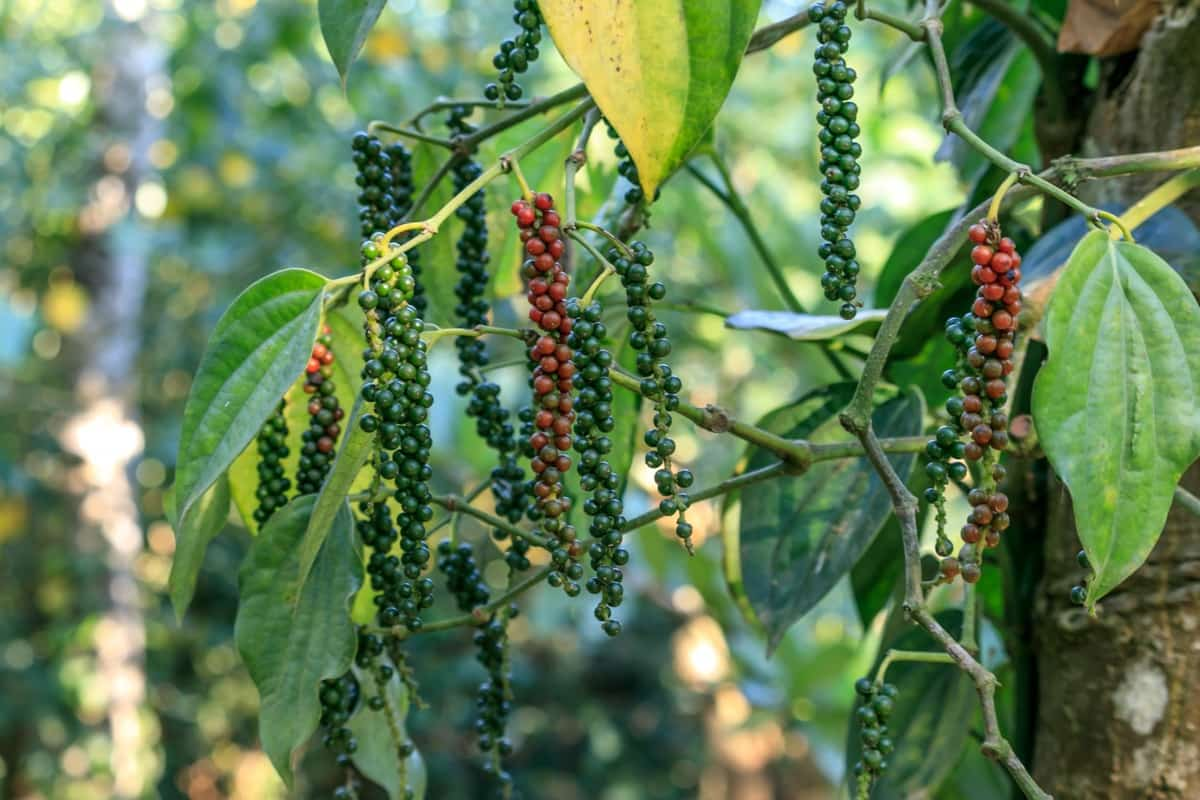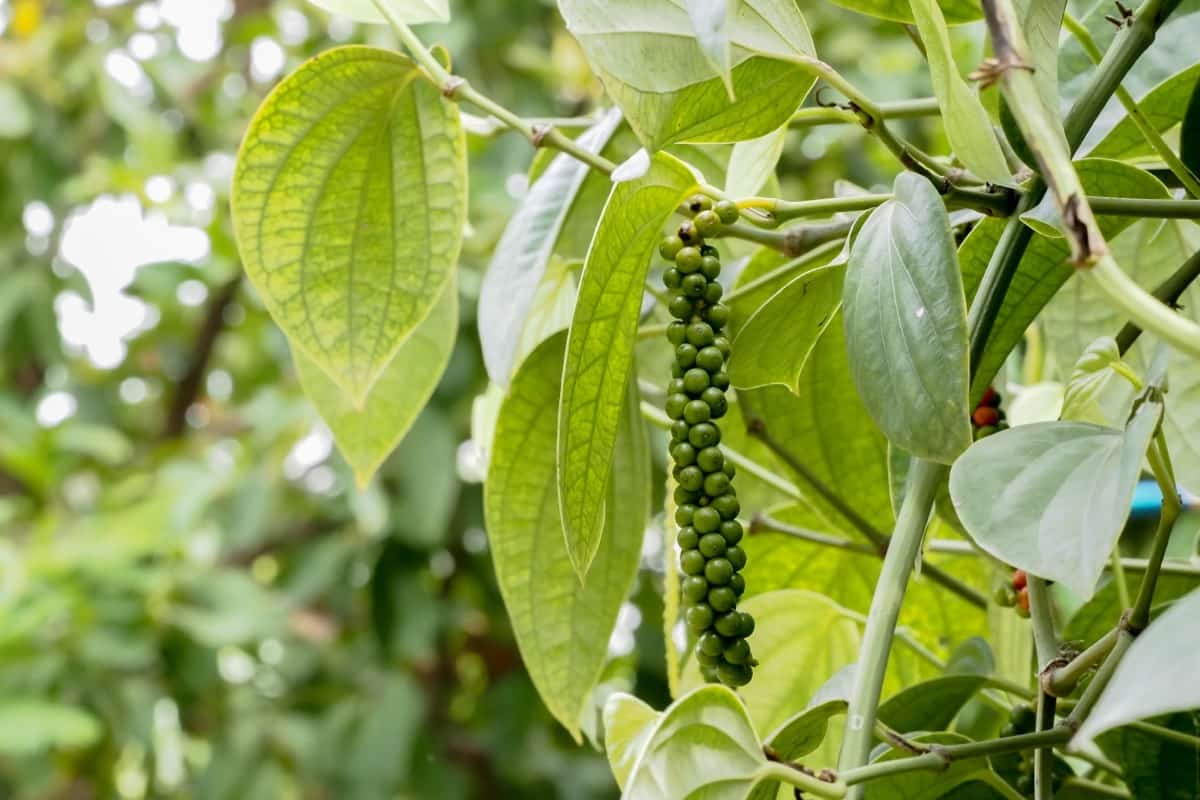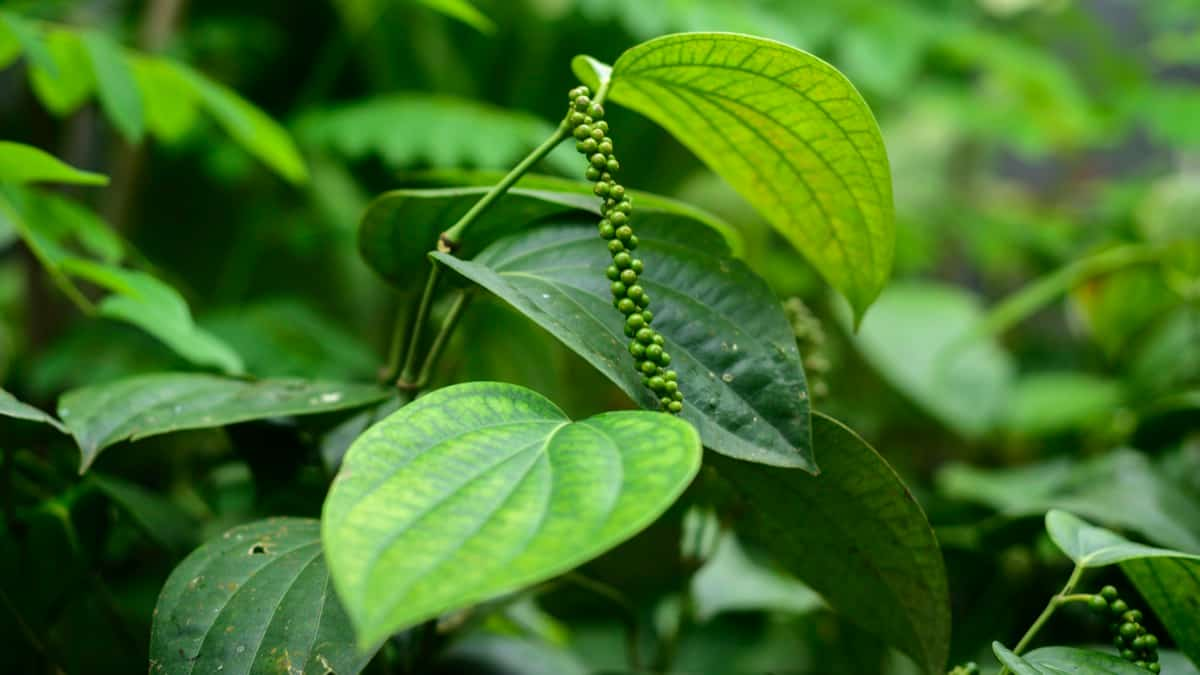Black peppers are essential to many gardens, providing a unique flavor and aroma to dishes. Unfortunately, despite their importance, these plants can be susceptible to various causes that can lead to their death. In this article, we will look at the nine most common causes of dying black pepper vines and how to fix them.

9 Causes of Dying Black Pepper Vines
Why is My Black Pepper Vine Dying in Summer Heat, and What Can I Do to Save It?
Black pepper vines dying in the summer heat have become a growing concern for many farmers. The heat can cause the vine to become dehydrated and stressed, leading to stunted growth, decreased yields, and even death. Heat can also cause the vine to become more susceptible to disease. The crop tolerates temperatures of 10 to 40°C. The ideal temperature is 23 to 32°C with an average of 28°C.
- To protect the vines from the summer heat, first, provide the vine with adequate soil moisture.
- Additionally, mulching around the vine can help to retain soil moisture and keep the vine cool.
- Planting trees or shrubs around the vine can help to provide shading during the hottest parts of the day.
Preventing Black Pepper Vine Death From Fungal Infections: Effective Remedies and Prevention Tips
- Ensure that the soil around your pepper vines is well-draining. Fungal spores thrive in wet soils, so keep the soil aerated and dry. Add compost, organic material, or a tiller to aerate the soil.
- Keep your pepper vines well-pruned. Fungal spores can grow in thick, overgrown vines, so make sure you trim back your vines regularly and keep them manageable.
- Weakened vines often cause fungal infections, so give your pepper vines plenty of sunlight, water, and nutrients. If you use fertilizer, ensure it is low in nitrogen and high in potassium.
- Common fungicides that treat black pepper vine fungal infections include Triadimefon, thiophanate-methyl, cyprodinil, and fludioxonil.
Identifying Nutrient Deficiencies in Black Pepper Vines and Remedies to Revive Them
If your black pepper vine is not growing at the normal rate, there is a good chance it suffers from a nutrient deficiency. Also, the vine leaves may start to turn yellow or become limp. This could also be indicative of a nutrient deficiency. If your black pepper vine has stunted leaves or is misshapen or discolored, it will likely suffer from a lack of nutrients.
- Yellow leaves and stunted growth characterize nitrogen deficiency in black pepper vines. Nitrogen-rich fertilizers should be applied at least once a year to give the vines enough nitrogen for growth.
- Dark green leaves and stunted growth indicate phosphorus deficiency in black pepper vines. A phosphorus-rich fertilizer should be applied at least once a year to correct this deficiency.
- Potassium deficiency in black pepper vines is indicated by yellowing of the leaves, reduced yields, and poor growth. A potassium-rich fertilizer should be applied at least once a year to address this.
How to Protect Black Pepper Vines From Pests and Diseases to Prevent Decline and Death
Protecting black pepper vines from pests and diseases prevents their death. Here are some tips to help you keep your pepper vines healthy and thriving.
- Choose a well-lit, sunny spot for planting pepper vines. Vines need at least 6-8 hours of sunlight daily to grow properly. Remove any infected leaves or branches and dispose of them safely.
- Neem oil. This natural insecticide disrupts the pests’ reproductive cycle, preventing new generations from forming. It is also effective against many pests, including aphids, whiteflies, and mites.
- Spinosad: This pesticide attacks the pests’ nervous system, cause them to paralyze and eventually die. It is most effective against caterpillars, leaf miners, moths, and beetles.
- The most common fungicides that protect black pepper vines from diseases are copper fungicides, such as copper sulfate and copper hydroxide, and synthetic fungicides, such as chlorothalonil, mancozeb, and azoxystrobin.
Overwatering Issues in Black Pepper Vines: Signs, Symptoms, and Steps to Rescue a Dying Vine
Overwatering is a common problem for black pepper vines. It can occur when the soil where the planted vines are not drained or aerated properly, leading to excessive water retention. Overwatering can also happen if too much water is applied to the vines, leading to soil saturation. The most significant is root rot, where the vines’ roots suffer from fungal or bacterial growth due to the soil’s high moisture content.
Once you have determined the state of the vine, you can begin the rescue process. First, stop watering it entirely. Allow the soil to dry out completely. This will help reduce the soil’s moisture and allow the vine to recover. Report the vine in fresh soil. Use a potting mix designed for peppers, and choose a pot with good drainage. This will help ensure that the vine doesn’t get overwatered again.
In case you missed it: Unlocking the Potential of Black Rice Farming: Best Production Package Practices

Underwatering Issues in Black Pepper Vines: Signs, Symptoms, and Steps to Rescue a Dying Vine
Underwatering issues in black pepper vines can be a major problem regarding successful growth and production. This is because black pepper vines need a lot of water to produce pepper; if the water is unavailable, the vines will begin to suffer. Underwatering can lead to decreased yields, wilting, and in some cases, death of the vines.
- Make sure to correct the soil moisture levels. First, you should check the soil for dryness by finger into the soil near the vine’s base. If the soil is dry, you can begin to water the vine. Water slowly and deeply to reach the vine’s root zone.
- It is also essential to ensure the soil around the vine is well-drained. If the soil is too damp, the plant could become waterlogged and, thus, suffer. Keep the soil moist but not soggy.
- If the soil is too compacted, consider loosening it with a trowel or fork. Also, ensure the soil is not too sandy, as this can cause the water to drain away too quickly.
Black Pepper Vine Winter Damage/dying: Protecting Vines From Frost and Cold Temperatures
When temperatures drop below freezing, black pepper vines are particularly vulnerable. The vines can be damaged or killed outright if exposed to prolonged freezing temperatures. Black pepper vines need to be watered regularly, especially during winter with less natural rainfall. Without regular watering, the plant will become dehydrated and die.
- To protect black pepper vines from frost damage, ensure they are adequately watered during fall. This will help to ensure that the soil around the vines is warm and moist, which can help to prevent frost damage.
- Keep the soil around the vines free of weeds and debris. This will ensure the soil can absorb heat from the sun during the day, which can help to prevent frost damage at night.
- Mulching with woodchips or straw can help insulate the soil and keep it warmer than the air temperature outside.
Improper Pruning May Cause Black Pepper Vine Death: Pruning Methods for Healthy Growth
Pruning methods are essential to the care and maintenance of black pepper vines. Pruning helps promote healthy growth.
- When pruning black pepper vines, always use clean, sharp pruning shears. Pruning should be done regularly during the growing season to remove dead or diseased growth, promote a healthy form, and promote branching. Prune the vine back to a few inches above the ground after the season’s final harvest.
- Removing any thick, woody growth that may be blocking air circulation and light to the center of the vine is important. Additionally, be sure to remove any diseased or damaged canes.
- Always prune the shoots back to the second or third node when pruning the vine. Pruning the vine back to just one node may result in weak growth.
Reviving a Stressed Black Pepper Vine: Rehabilitation Methods for Overall Recovery
The first step in reviving a stressed black pepper vine is to identify the cause of the stress. The most common causes of stress for black pepper vines include too much sun, too little water, too much fertilizer, or an infestation of pests. Once the issue is defined, it can be addressed appropriately.
If the vine receives too much sun, it is important to ensure it is shaded from direct sunlight. This can be done using a trellis, lattice, or other shading material. If the vine is not receiving enough water, it is important to increase the watering frequency to keep the soil moist but not soggy. If too much fertilizer is causing stress, reducing the amount of fertilizer applied is important. Finally, if pests are causing stress, use a safe vine pesticide.
In case you missed it: Frequently Asked Questions About Growing Thai Dragon Pepper from Seed to Harvest

Conclusion
You can help ensure that your black pepper vines stay healthy and thrive with a few simple steps. By paying attention to the needs of your plants and addressing any issues that arise, you can help prevent the problems that lead to dying black pepper vines.
- Feed Your Flock for Less: Top 10 Tips to Save on Chicken Feed
- Ultimate Guide to Ossabaw Island Hog: Breeding, Raising, Diet, and Care
- Hatching Answers: The Top 10 Reasons Your Chickens Aren’t Laying Eggs
- Eggs and Economics: Breaking Down the Cost of Raising Backyard Chickens
- Defend Your Greens: Proven Methods to Keep Iguanas Out of Your Garden
- Ultimate Guide to Cinnamon Queen Chicken: A Comprehensive Guide for Beginners
- Ultimate Guide to California Tan Chicken: Breeding, Raising, Diet, Egg-Production and Care
- Ultimate Guide to Marsh Daisy Chicken: Breeding, Raising, Diet, and Care
- 10 Types of Chicken Farming Businesses You Can Start for Profits